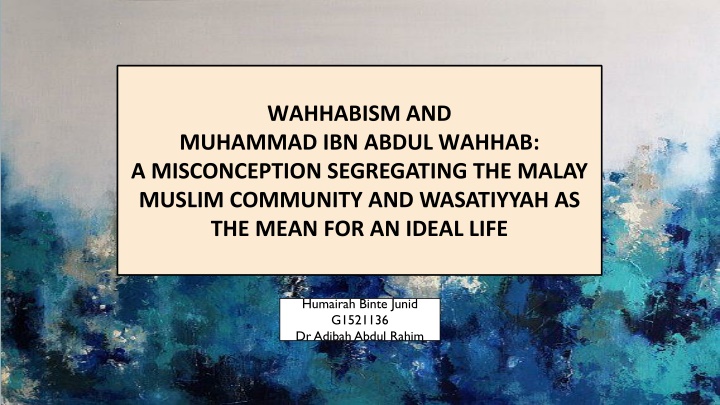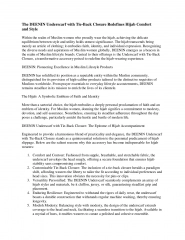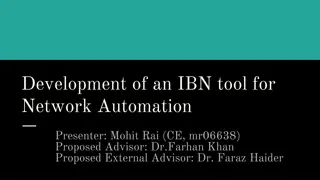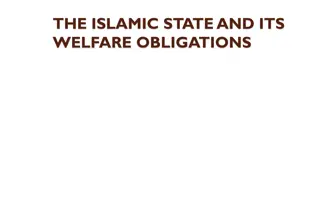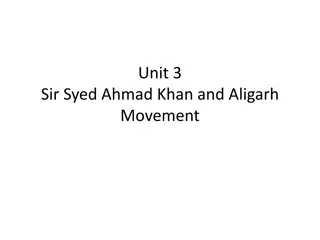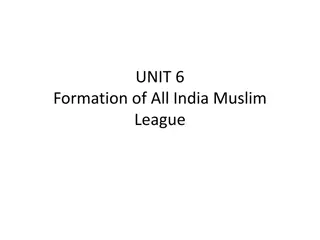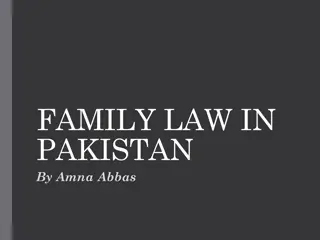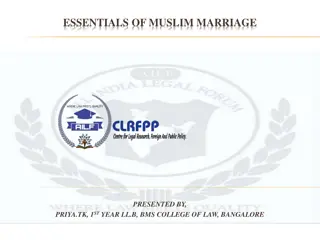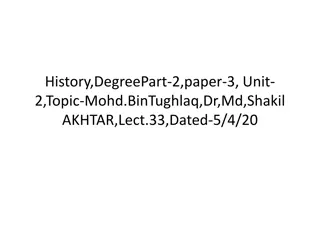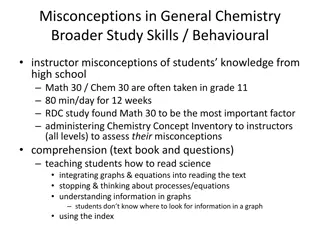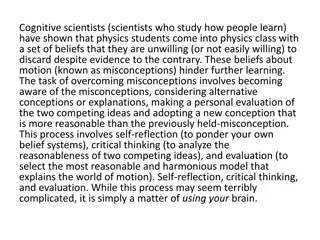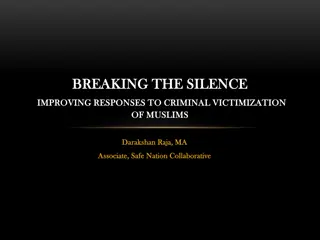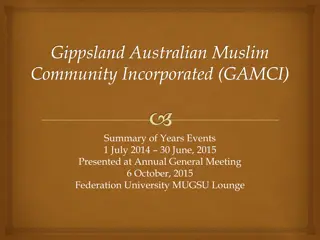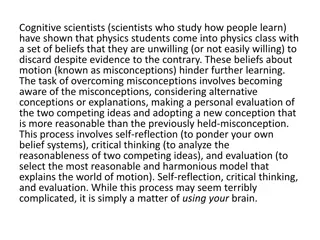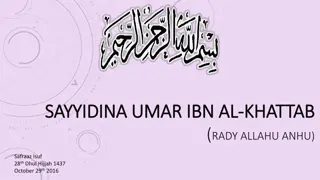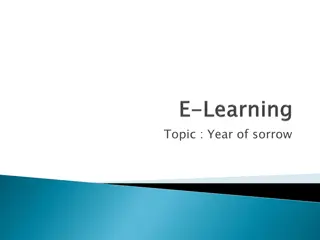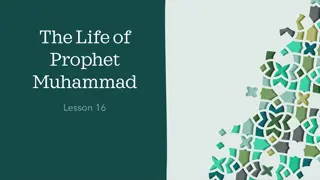Misconceptions Surrounding Wahhabism and Muhammad ibn Abdul Wahhab in the Malay Muslim Community
The article delves into the misconceptions and conflicts between Wahhabism and Malay Sunni beliefs, highlighting the lack of understanding about the origins of Wahhabism. It explores the differences between Wahhabis and Sunnis, shedding light on the life of Muhammad ibn Abdul Wahhab and his teachings. The narrative emphasizes the importance of Wasatiyyah for ideal communal living and challenges the negative stereotypes associated with Wahhabism.
Download Presentation

Please find below an Image/Link to download the presentation.
The content on the website is provided AS IS for your information and personal use only. It may not be sold, licensed, or shared on other websites without obtaining consent from the author.If you encounter any issues during the download, it is possible that the publisher has removed the file from their server.
You are allowed to download the files provided on this website for personal or commercial use, subject to the condition that they are used lawfully. All files are the property of their respective owners.
The content on the website is provided AS IS for your information and personal use only. It may not be sold, licensed, or shared on other websites without obtaining consent from the author.
E N D
Presentation Transcript
WAHHABISM AND MUHAMMAD IBN ABDUL WAHHAB: A MISCONCEPTION SEGREGATING THE MALAY MUSLIM COMMUNITY AND WASATIYYAH AS THE MEAN FOR AN IDEAL LIFE Humairah Binte Junid G1521136 Humairah Binte Junid G1521136 Dr Adibah Abdul Rahim
INTRODUCTION - Muslims has a role in changing the fate of their own religion - Regrettably, they help to escalate the phenomenon of Islamophobia even more - Internal problems: lack of tolerance, habit of labeling others, fanaticism and violence - Malays dispel Wahhabism as they are not bilateral with Sunni thought and they call them Wahhabis with with negative denotation traditionalists, conservatives, literalists, etc - While Wahhabis accuse the people whom against their ideology as extremists and sometimes to the extent of declaring others as Kafir - Wahhabis and Malay Sunnis fail to understand the origin of Wahhabism - Wahhabism is a misnomer with reference to the scholar Muhammad ibn Abd Wahhab - Wahhabism is not a new movement founded by Muhammad ibn Abd Wahhab nor it is an addition to the the four mazhabs - In attesting their own evidences, the Sunnah in ascribing good ethics and respect among other people were put in secondary absence of Wasatiyyah in the community
THEIR DIFFERENCES IN A GLANCE Wahhabis Sunnis Practice Maulid, Tahlil, Berzanji, etc Label Wahhabis as literalist, fundamentalists, conservatives, backward people If Wahhabism to them is associated to Muhd Ibn Wahhab, it should not be accompanied with a bad connotation Against Maulid, Tahlil, Berzanji, etc Label others as practicing bid ah, declare them as apostates which may resort to violence They thought they are following Muhd Ibn Abd Wahhab but in fact, he did not encourage any factors that can lead to disunity Against furu matters (opposite of Muhd Ibn Abd Wahhab s mission usul, aqidah)
THE CHRONICLE OF MUHAMMAD IBN ABDUL WAHHAB Born in the town of Uyaynah in the year 1703CE, into the family of Musharraf of the tribe of Tameem. Since the tenth Hijri Century, his family was known for its religious scholars and leaders. His father, Abdul Wahhab was a judge in al- Uyaynahspecializing and ascribing to Hanbali s school of thought whom later Muhammad studied the Hanbali Fiqh from. He travelled to Mecca, Madinah, Najd, Hijaz, Damascus, Baghdad and Basra to acquire knowledge* Muhammad Ibn Abdul Wahhab headed to Huraimila to meet his father between 1731CE and 1736CE - 1740CE : his father died and it was the beginning of his da wah 38 years old - He wrote Kitab al-Tauhid He became the leading scholar in the area and was more open compared to his father in his teaching and calling of others to the straight path. Died in Shawwal 1791/1792CE and lived for some ninety-two years
THE MISSION OF MUHAMMAD IBN ABDUL WAHHAB To purely resurrect Tauhid and the practice of Sunnah in the life of the Ummah Similar to the mission of the Prophets, he wanted to destroy all the polytheistic practices and to stop further destruction of the pristine state of Islam The people of his time: - worshipped graves and revered trees and stones - heresies and idolatrous acts had become a norm in the community His mission was necessary - Most of his books are nothing but compilations of texts from the Quran and the Sunnah with minimal amount of his own wordings between them - His reform was mainly focused on eradicating elements that threaten the fundamental (usull) teachings of Islam which is Tauhid (monotheism) and not the non-fundamental matters (furu )
ORIGINS OF WAHHABI THOUGHT The first person in record to mention the term Wahhabi British captain, Sadler congratulated Ibrahim Pasha for destroying the Wahhabi state . It is also reported that after World War I, the first Earl of Crewe, Britain s Secretary of State for the Colonies, pithily summed up his country s objectives: What we want is not a united Arabia but a disunited Arabia split into principalities under our suzerainty. It is not wrong to assume that the creation of an alienated term Wahhabi was just one of their discreet ways in attempting to attack Islam.
MISCONCEPTION ON MUHAMMAD IBN ABDUL WAHHAB - Whenever the people of desires and innovations are confronted with the Truth and they intend on rejecting it, they will create labels or accept alienated names that will scare people away to maintain their misguided ways. Wahhabism was taken after his name Charged of bringing in new mazhab Secret British agent or spy He was a great scholar of Hanbali mazhab who contributed to that school of thought through his writings and he also gave fatawa using the rulings of that mazhab. The presence of British council was only recognized in Basra in 1767CE and that is an estimation of 27 years of gap after Muhammad left Basra before 1740CE. - The mission of Muhammad Ibn Abdul Wahhab was to bring back Tauhid, and it is irrational for the British to ask from him to do the da wahas they emphasized on Christianity His name is Muhammad while Wahhab was his father - Followers may not always reflect the true stance of the original teacher or teachings.
MISUNDERSTANDING OF WAHHABISM AMONG MALAY MUSLIM COMMUNITY The mission of Muhammad Ibn Abdul Wahhab was to stop people from the polytheistic beliefs and practices which relates to fundamental (usul) principles in religion. These at the very essence of its mission differs from the da wahof Muhammad Ibn Abdul Wahhab and what is understood among Malay Muslim people. While Malay Muslim community exaggerated towards non-fundamental (furu ) issues in religion, for an instance, the celebration of Maulid, appraisal zikr upon Prophet Muhammad peace be upon him - and others The term Wahhabi seems to take on different meanings in different times and places If the Wahhabis are truly the followers of Muhammad Ibn Abdul Wahhab, they would definitely want to denounce the term as it originated from the British The Wahhabis within Malay Muslim community are fond of declaring other Muslims as apostates as they practice those that are not from their teachings Allah said in the Quran in Surah al-Tamhi d 17:21, When a man calls his brother an unbeliever, it returns at least to one of them
DISPEL THE HABIT OF LABELING OTHERS THROUGH WASATIYYAH lead to bigger negative causes. Labeling others traditional religious education within Muslim societies gives too much emphasis on ilmu ibadah and tasawwuf that it neglects the education on the concept of Wasatiyyah PROBLEM With the emergence of many movements within Muslim community like Wahhabis , Syi ites, secularized and liberalized Muslims, they tend to ignore religious doctrines and viewpoints because they were fanatics towards their own ideologies.
Preserve the pristine purity of the religion Tauhid and execute the commandments of Allah, accompanied by a God-fearing mind-set Excellence, Best and Goodness personal conduct and behavior Balance enjoin what is right and forbid what is wrong Just other-worldly goals and this- worldly responsibility having a peaceful relationship with other religion practicing religious tolerance QUALITIES OF WASATIYYAH Straightness And the last connotation is that Wasa iyyah oppose religious and moral extremism economic consumption Implies the avoidance of the excessiveness or the negligence of earlier religious communities propagation of Islam Represents the youths who occupy the intermediate position between the weakness of childhood and old age. Strength
According to the Prophet - peace be upon him, justice requires being in the middle position between two or more opposing sides, without inclining towards any of the sides, not swayed by emotions, biases or prejudices in making judgments, decisions or solving disputes. One must also uphold justice even if it is against self-interest. It emphasizes on religious tolerance (accept differences of opinions) and balance in the propagation of Islam it pushes mankind to have balance in having a peaceful relationship with other people, regardless of their beliefs and practices. WASATIYYAH HELPS DISPEL THE HABIT OF LABELING OTHERS Wasatiyyah will naturally instill God- fearing mind-set in Muslims and connotes the Best Community who are put responsible to enjoin what is right and forbid what is wrong, but a Muslim is not deserving to carry his responsibility if within himself is filled with negative assumptions, hatred and animosity towards others Wasatiyyah also means opposing religious and moral extremism, even if one stance of thought might parallel to his self-interest or beliefs. When labeling others, Muslims too has given upon themselves the authority to judge others but mankind has only one Judge and that is The Almighty Allah
CONCLUSION Muhammad Ibn Abdul Wahhab: religious reformer who cleanse the religion of unauthentic elements Labeling others negatively may have caused regression in the social development of Malay Muslim community Ascribing names to any da wah movement will indirectly cause disunity among Muslims for naming creates exclusive environment in nature In the present time, two things are happening: Everyone who disagree with mainstream practices are being labeled Wahhabi Wahhabis are being blamed for everything although there are many people who claim to be Wahhabis are doing things that are inconsistent with the principles of Muhammad Ibn Abdul-Wahhab. Thus, the present is a crucial time in which it is preferable not to use the term Wahhabi or Wahhabism and, instead, force all to trace their claims back to the Quran and Sunnah will make people learn to accept other people s views on things stop the habit of labeling will clear the name of Islam as a whole in the bigger scope WASATIYYAH It is vital for Muslims to overcome the intra-religious problems first before tackling the challenges posed by non-Muslims unity plays a big part in the success of a mission.
